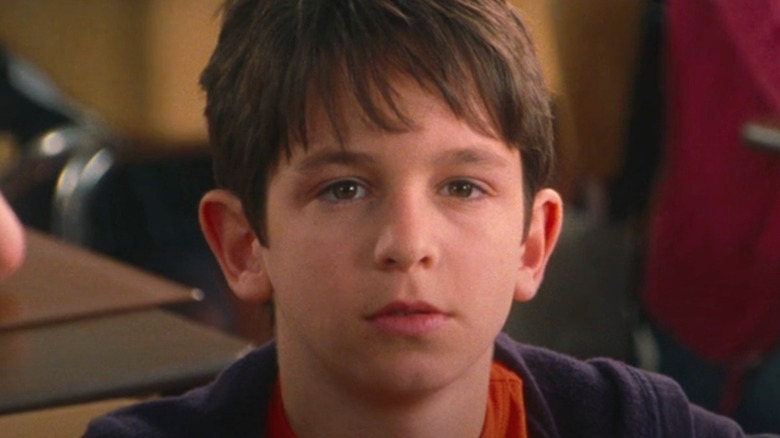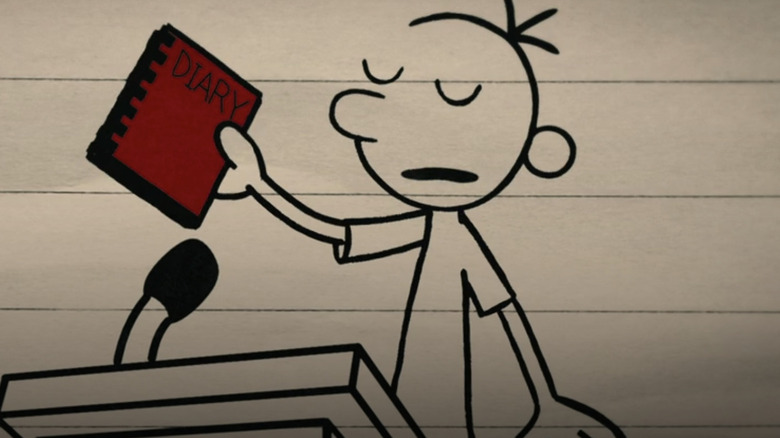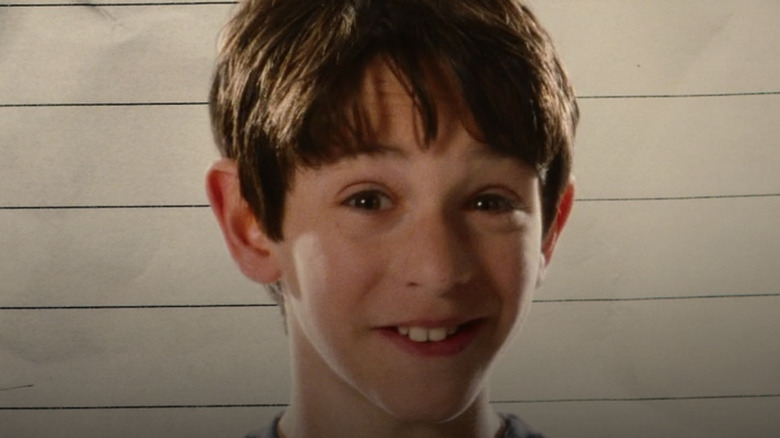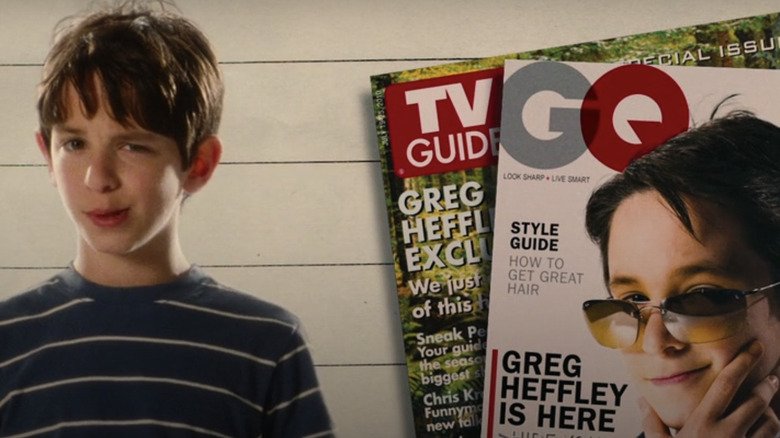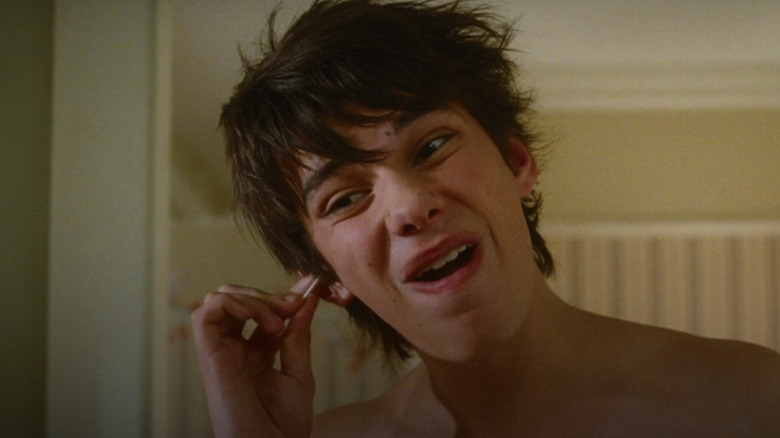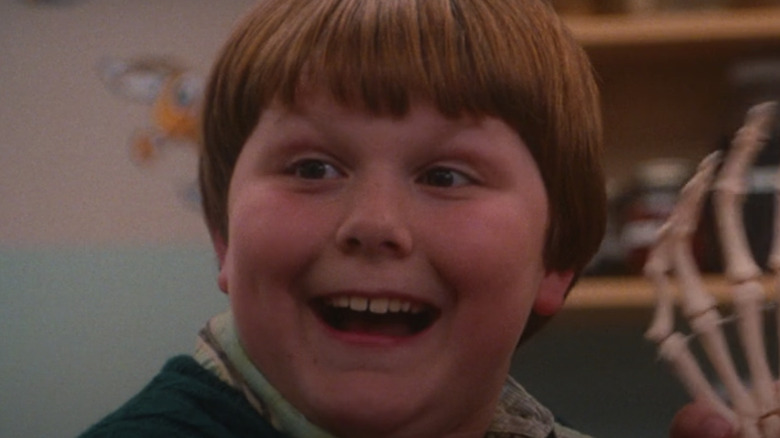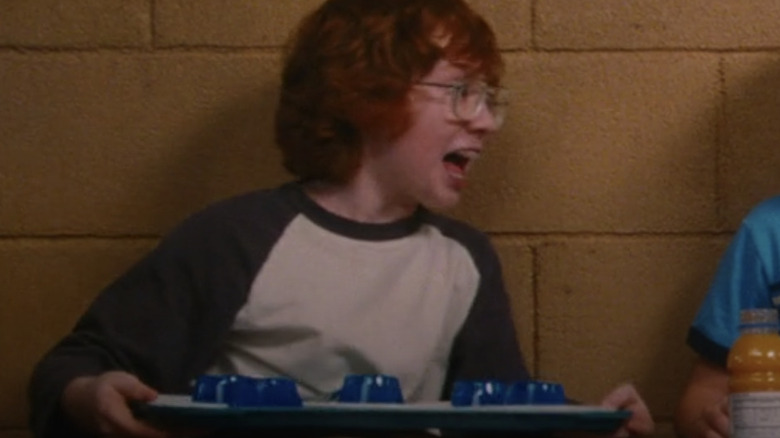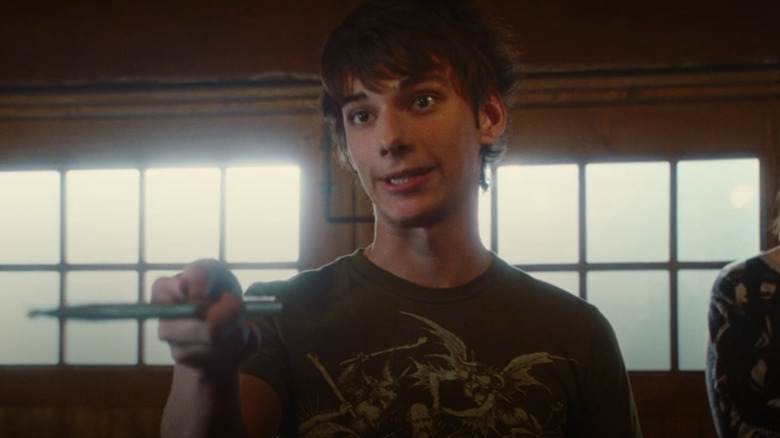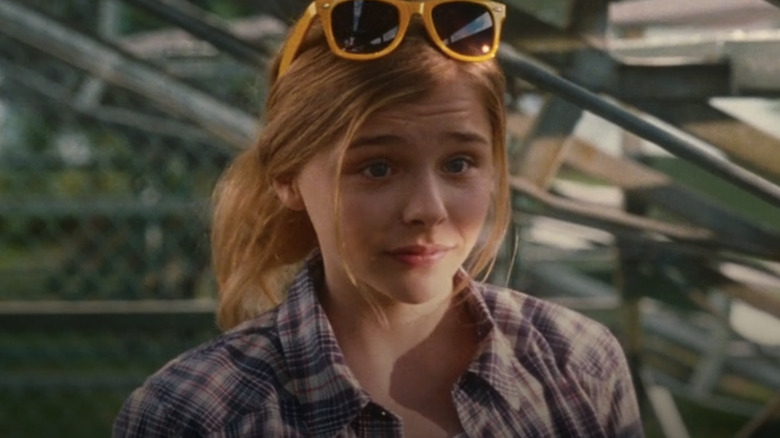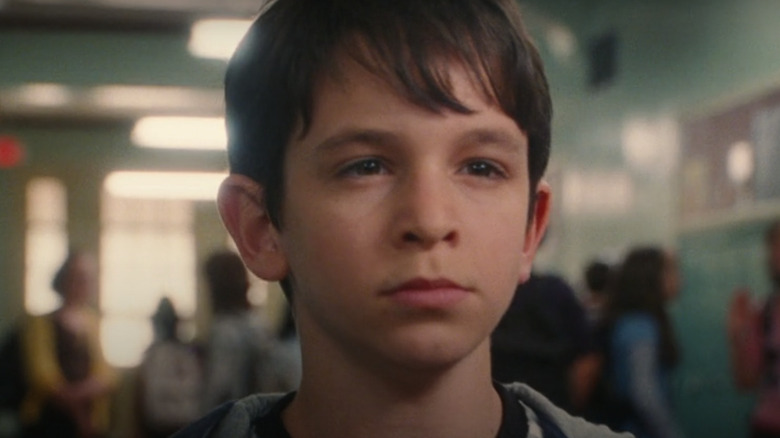Things In Diary Of A Wimpy Kid Only Adults Notice
Every year for the better part of two decades, writer and artist Jeff Kinney, best known for his immersive online world "Poptropica," delights millions of young readers with another entry in his "Diary of a Wimpy Kid" series. A publishing phenomenon, each one sells millions (via The Hollywood Reporter) and provides more loosely connected and stick figure-illustrated stories about the life of arrogant, self-aggrandizing tween Greg Heffley. He suffers one indignation and relatable moment after another in his never-ending saga as a lazy middle school student and overlooked middle child.
"Diary of a Wimpy Kid" has been turned into movies on several occasions, the first hitting theaters in 2010 and depicting the events of the first book in the series. It's a movie expressly made for children, but there's a lot within that adults can relate to, find funny, or might even only notice because they've got the luxury of wisdom and age. Here are all the things that only grown-ups will notice in the first "Diary of a Wimpy Kid" film.
Greg Heffley dreams in cartoon
Technically speaking, "Diary of a Wimpy Kid," the source material for the 2010 movie of the same name, is an epistolary graphic novel, as it is told in the first person as a series of episodic journal entries. Almost all of these entries are illustrated by the in-universe author, Greg Heffley. In adapting the book for film, the diary element is preserved by presenting Greg as the narrator of the film, presenting the film's events as they unfold in real-time as if they are reflective diary entries.
However, probably in an effort to keep intact Kinney's popular and iconic illustrations from the published form of "Diary of a Wimpy Kid," some sequences are rendered in cartoon form. These include Greg's dream sequences, visions of his future, and flights of fancy. His thoughts are apparently animated stick figure drawings and scenarios which look just like the ones from the books, except they move.
In other words, as older viewers are more likely to notice, Greg Heffley in "Diary of a Wimpy Kid" the movie, dreams in cartoons. Not only is his inner life full of whimsy and fabulosity, but it's presented in the form of animation, indicating that Greg's brain really doesn't work like everybody else's.
Greg Heffley is extremely talented
The whole conceit of "Diary of a Wimpy Kid," both the book and the movie, is that it's the life story of 11-year-old Greg Heffley, told as it happens, in the form of daily journal entries. Older viewers will understand that every single vignette in the movie corresponds to a diary entry, and every single one of them is well-written, perfectly told, and thoroughly polished. Beyond that, each entry contains a seamless beginning, middle, and end, all of which ties back to previous stories. That's extremely impressive on its own, without even factoring in that Greg illustrates his stuff, which he is equally nonchalant about.
In the real world, the "Diary of a Wimpy Kid" books are blockbusters written by an adult. But in the fictional universe of "Wimpy Kid," they're composed and illustrated by a child — which means that child is an accomplished, precocious, preternaturally gifted artist and storyteller capable of turning out work of bestseller quality. Adult viewers will recognize this, particularly how it's a contrast to how the character of Greg is presented — that he's kind of a dud, or literally a "wimpy kid." Greg is anything but, as this child clearly has a bright future.
Greg Heffley's psychological profile is troubling
Greg Heffley's overall personality, along with the way some of his overriding traits are presented, just may startle more mature viewers of "Diary of a Wimpy Kid." Adults may even be inspired to kick their armchair analyst into action, conjuring up lessons learned in Psychology 101.
In the film, Greg seems to operate on a different plane of reality than the other characters, coldly stating as fact that he holds an extremely high opinion of himself that his actions, and the events of the film, do not support. Early on, Greg explains to the audience that they're watching a movie about his life because he always figured he was so interesting he'd get the big-screen treatment. The same sequence also shows Greg fantasizing about appearing on a bunch of major magazine covers, seemingly only just because he's so great.
Greg also heads into middle school with a cocky attitude, placing himself very high on a popularity ladder of his own making, when it's clear to viewers that he's anonymous at best and a social pariah at worst. Ultimately, Greg is more than just wimpy (which is the writer's and filmmakers' assessment, not his own), he's a deluded narcissist bent on using others for his own gain.
The Heffley family is highly dysfunctional
The Heffley family dynamic, at least as presented through the perspective of Greg Heffley in "Diary of a Wimpy Kid," is one of chaos, dysfunction, and unfairness. Adult viewers may recognize their own messy upbringing in the ways the Heffley parents and siblings interact, and they might be made slightly uncomfortable by all that.
Greg endures the classic middle child plight of being overlooked and ignored by his mother and father because older brother Rodrick and younger brother Manny always need attention or discipline. For instance, Rodrick is a sass-mouthed teen who lives like a slob and gets a dressing down from his mother for possessing a bikini magazine. Manny similarly lives a messy existence, as he is a toddler at the age where he's obsessed with his bodily functions and simultaneously toilet training. These issues seem to occupy all of Greg's parents' time, while Greg himself goes unnoticed.
Rodrick also bullies Greg, playing cruel pranks on him, like convincing him in the middle of the night in the summer that he's late for the first day of school. And Greg is the one who gets in trouble because he wakes up the whole house. His parents are especially irritated because once Manny is up, he won't go back to sleep. Rodrick, as usual, goes unpunished and heads back to sleep in the giant apartment-like bedroom which his parents have bestowed upon him. He's clearly the Heffley parents' favorite kid.
Greg is abusive and cruel to his best friend
Greg Heffley's dark psychological and behavioral tendencies, combined with the sometimes unfair treatment he receives at home, just may have combined, coalesced, and twisted into turning Greg into a bully. Older viewers will recognize that, because bad stuff metaphorically rolls downhill, Greg takes out his power-tripping aggressions on his best friend (well, only friend), Rowley Jefferson.
Rowley is a sweet kid, immature but unabashedly pleasant, who is uninterested in acting cool or being anything other than himself. Greg, obsessed with social standing, places himself very high on an imaginary pecking order, and Rowley near the bottom, then proceeds to act like hanging out with him is some big favor.
Nevertheless, in their private interactions, Greg is unabashedly mean and manipulative. His favorite game consists of whipping a ball at Rowley's head while his friend rides a Big Wheel. Rowley sheepishly asks Greg if maybe he can be the one to throw the football and Greg the rider, which Greg refuses on account of how he's a great thrower and Rowley the better rider.
There are lots of odd and mature sight gags
The action in "Diary of a Wimpy Kid" flies by with speed and attitude. It's understandable, as filmmakers had to cram every beloved bit from the monster hit of a source novel into a kid-friendly 90-minute running time while also adhering to 2010s-era family movie procedure and keeping things moving along at an energetic, break-neck pace. At the very least, this means that younger viewers will be busy absorbing the plot and comparing scenes to how they played out in the book. Meanwhile, older viewers who don't care as much about those details can stay on the lookout for secret jokes, Easter eggs, and things that capture their more sophisticated adult attentions.
There are plenty of quickly appearing sight gags seemingly geared toward adult viewers who can appreciate a joke, hidden in images that kids might not even notice. For example, Fregley, the shamelessly weird geek whom Greg tries to keep at an arm's length, sits down for lunch on the first day of school bearing a strange meal — a half dozen or so plates topped with orbs of blue-colored gelatin. That's pretty strange, but funny. In another gag, cynical, older middle-schooler Angie is depicted reading "Howl," a powerful and incendiary work of modern poetry written by controversial Beat Generation figure Alan Ginsburg — someone adults will know, but most kids definitely will not.
Rodrick's band doesn't know what it is
"Diary of a Wimpy Kid," both the books and movies, seems to be set in a world almost out of place and out of time. It's meant to draw readers and viewers in by presenting as bland and generic of a contemporary suburban upbringing. It could reasonably take place in 1995 or 2005 or 2015, and indicative of this odd timelessness is Löded Diper, which is both a garage band and a reason for living for Greg Heffley's degenerate teenaged older brother, Rodrick.
Astute older viewers will notice that filmmakers made Löded Diper try to be too many things, and disparate ones at that. Löded Diper presents itself with the visual trappings of an early '80s punk band, and its name evokes the in-your-face edginess and blunt comedy of the Sex Pistols or Buzzcocks. However, the music they play isn't punk. It's not played quickly, sloppily, and with a proud lack of skill, but rather mid-tempo, with solid musicianship, and a blues, low-fi sound evocative of a garage band, or The White Stripes.
What's the deal with Angie?
"Diary of a Wimpy Kid" is for and about tweens and kids around that age, and as such, the adult characters are minor. For the most part, they are purposely one-dimensional, buzz-killing authority figures in the form of parents and teachers. The audience surrogate, and the most relatable entry point into the movie for older viewers, comes in the form of Angie Steadman, an older kid at Greg's middle school.
Amusingly to adults, this child that is just slightly older than the other children serves as a seasoned, wizened font of wisdom and life experience, a world-weary, friendly oracle that Greg and Rowley can consult, commiserate with, and come to for counseling and advice. Angie (Chloë Grace Moretz) is a reporter for the school newspaper and is often seen reading a book, which plays as both curious and mature, making her the character adults can identify with.
There's another side to Angie that's a bit perplexing, however. Angie isn't a character in the books but was instead written specifically for the movie. Her interactions with Greg and Rowley are so fleeting and random and yet so productive in providing exactly the words the two boys need to hear that older viewers may wonder if Angie is a figment of the main characters' imagination.
There are some questionable choices on the soundtrack
Like most live-action kid movies produced in the last 20 years or so, "Diary of a Wimpy Kid" boasts a musical soundtrack consisting of numerous energetic, uptempo songs. Such lively tunes propel the plot forward and underscore its characters' zany, bewildering adventures. In this case, those adventures are a series of humiliations and experiences that happen to brand-new middle-schooler Greg Heffley.
The songs the music supervisors have selected are not only jaunty, but they're usually well-known and thus fraught with meaning and history for the older viewers who have pre-existing memories or understanding of those tunes — and they're way out of line for a kiddie film. The most egregious example of this occurs in a montage set to Rick James' 1981 funk classic "Super Freak." That's a song about a "very kinky girl" who frequently engages explicitly and physically with "the boys in the band," particularly the narrator himself, her "all-time favorite." Beyond that, the song's narrator accompanies the woman back to a hotel room, specifically "Room 714," which is actually a reference to the drug Quaaludes, according to "Super Freak: The Life of Rick James."
